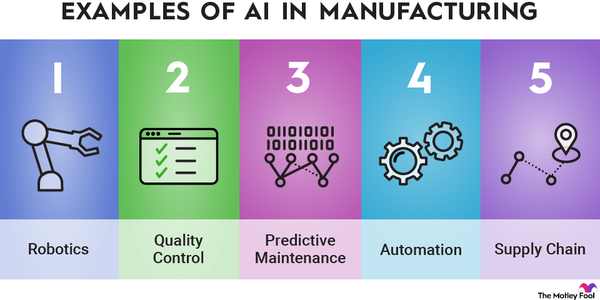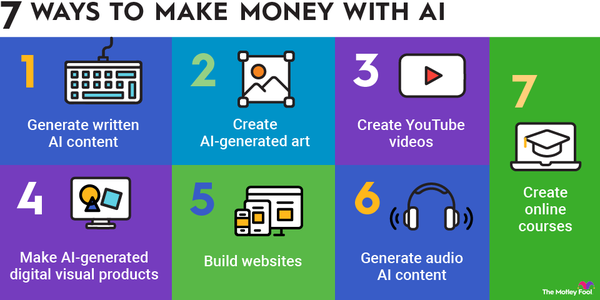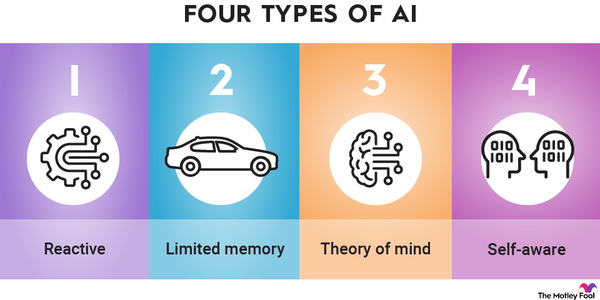You probably interact with artificial intelligence (AI) more often than you think. It's the algorithm arranging your Netflix (NFLX -0.51%) menu, the software expediting your Amazon (AMZN -1.14%) package, and the brains behind many of the smartphone apps you use every day.
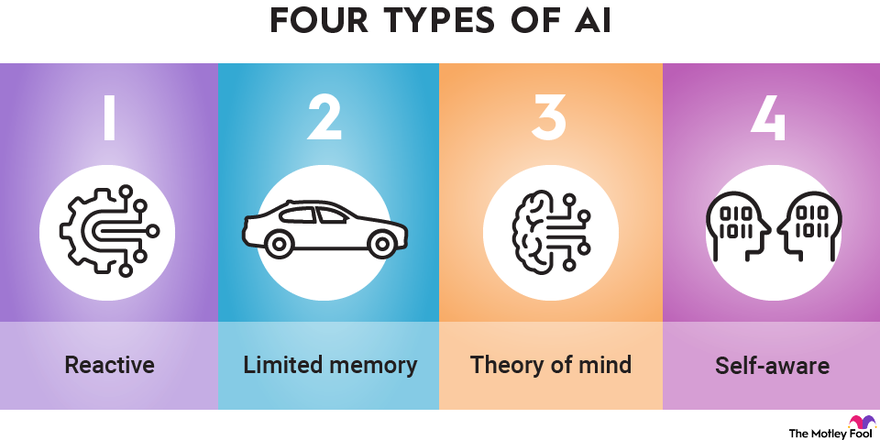
If you've used ChatGPT, the OpenAI chatbot that has wowed users by writing code and instantly answering complex questions, you've gotten a glimpse into the next frontier in AI, known as generative AI. Big tech companies and others are racing to develop the leading AI chatbot and other generative AI technologies.
Artificial Intelligence
If you want portfolio exposure to AI companies but don't want to identify individual AI stocks, you can invest in an AI-focused exchange-traded fund (ETF). AI ETFs provide exposure to a broad range of the best AI companies, eliminating the need to research and choose individual stocks on your own.
Best AI ETFs
Best AI ETFs to buy in 2024
| AI ETF | Assets Under Management | Expense Ratio |
|---|---|---|
| Global X Robotics & Artificial Intelligence ETF (NASDAQ:BOTZ) | $2.48 billion | 0.69% |
| ROBO Global Robotics and Automation Index ETF (NYSEMKT:ROBO) | $1.4 billion | 0.95% |
| iShares Robotics and Artificial Intelligence ETF (NYSEMKT:IRBO) | $599.7 million | 0.47% |
| First Trust Nasdaq Artificial Intelligence ETF (NASDAQ:ROBT) | $491.3 million | 0.65% |
Keep reading to learn more about each of these AI ETFs.
1. Global X Robotics and Artificial Intelligence ETF
1. Global X Robotics & Artificial Intelligence ETF
Established in 2016, the Global X Robotics & Artificial Intelligence ETF (BOTZ 0.55%) is a fund that seeks to "invest in companies that potentially stand to benefit from increased adoption and utilization of robotics and artificial intelligence." That includes enterprises working in industrial robotics, automation, non-industrial robots, and autonomous vehicles.
BOTZ currently holds 44 stocks. Its top five holdings, which account for about 47% of the fund's assets, are:
- Nvidia (NVDA 0.76%): A semiconductor maker whose chips are used in a wide variety of applications -- including autonomous vehicles, virtual computing, and cryptocurrency mining -- and are central to many AI technologies
- Intuitive Surgical (ISRG -0.41%): Maker of the da Vinci robotic surgical system, which allows for minimally invasive surgeries with precise control
- ABB (OTCPK:ABBN.Y): Swiss maker of industrial automation and robotics products for use in utilities and infrastructure
- Keyence (KYCCF 2.85%): A Japanese company that makes factory automation products, such as sensors and scanners
- Fanuc (FANUY -0.85%): Japanese manufacturer of factory automation products, including lasers, robots, and electric injection molding machines
As the chart below shows, shares of the ETF have underperformed the S&P 500 since its launch in 2016. The share price fell sharply in 2022, in line with the broad sell-off in tech stocks.
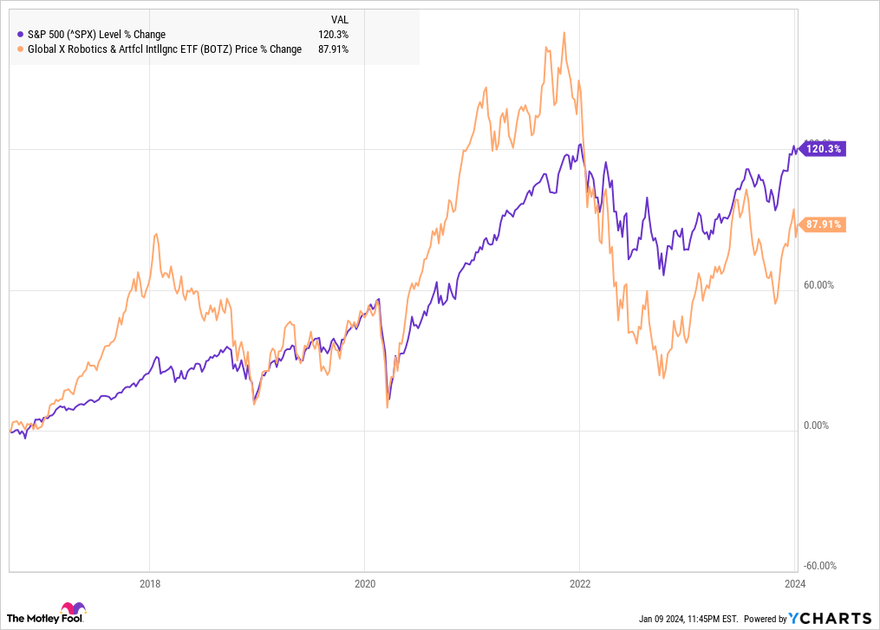
BOTZ offered a modest dividend yield of 0.2% at the time of this writing, but it is better suited as a growth-oriented investment. Its expense ratio of 0.69% is higher than what you'd pay for an index fund, but it's also reasonable for the fund's performance history.
2. ROBO Global Robotics and Automation Index ETF
2. ROBO Global Robotics and Automation Index ETF
The ROBO Global Robotics and Automation Index ETF (ROBO -0.24%) is focused on companies driving "transformative innovations in robotics, automation, and artificial intelligence." ROBO invests in companies primarily focused on AI, cloud computing, and other technology companies.
Cloud Computing
ROBO holds 77 different stocks, with no single holding accounting for more than 2.2% of the ETF's value. Its top five holdings comprise only about 9% of the fund's total value. These five companies include Intuitive Surgical, the maker of the da Vinci surgical robot, and four others:
- Azenta (AZTA -1.33%): A life sciences company that specializes in cold storage solutions and genomic services such as gene sequencing
- Illumina (ILMN -1.35%): Another life sciences company known for gene sequencing and an early cancer detection test
- Rockwell Automation (NASDAQ:ROK): A specialist in industrial automation services, servicing industries like semiconductors, warehousing, logistics, publishing, airports, food and beverage, and others
- Teradyne (TER -1.83%): A maker of automatic test equipment used in the semiconductor industry for wafer-level and device-package testing
Since its inception in 2013, ROBO has underperformed the return of the S&P 500, as the chart below shows. It trails the broad market index, with dividends factored into the return. ROBO pays a dividend yield of 0.05%, and its expense ratio is 0.95%.
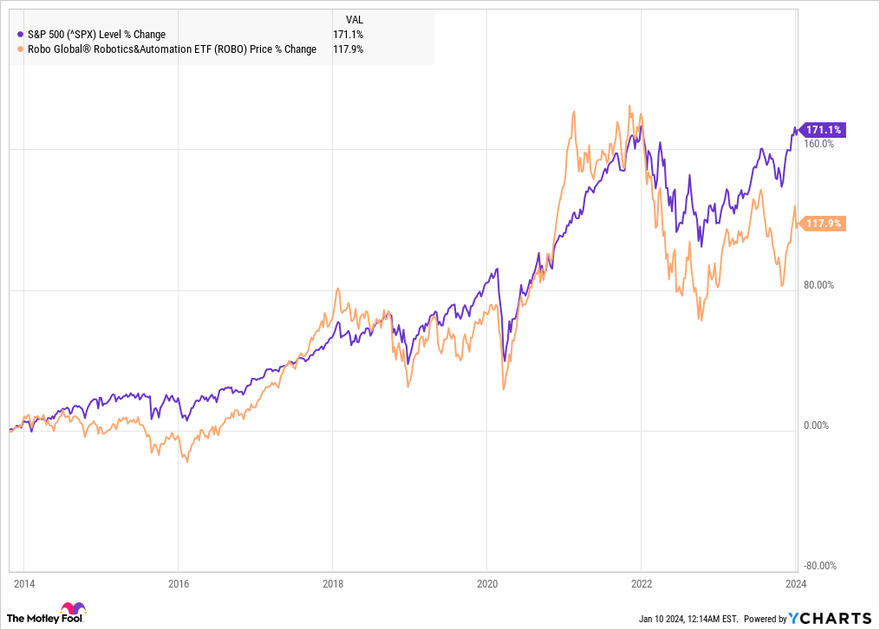
3. iShares Robotics and Artificial Intelligence ETF
3. iShares Robotics and Artificial Intelligence ETF
The iShares Robotics and Artificial Intelligence ETF (IRBO 0.25%) aims to track the results of an index of developed and emerging market companies that could benefit from the long-term opportunities in robotics companies and AI.
IRBO was formed in 2018 and has less than $1 billion of assets under management. With 118 stock holdings, it's now well diversified. Many of its top holdings also give investors exposure to fast-growing small-cap companies.
The fund's top five investments, which account for about 5% of IRBO's assets, are:
- Snap (SNAP 6.7%): The social media company best known for Snapchat is making waves in AI, thanks to its augmented reality and chat and an AI chatbot with more than 150 million users.
- Advanced Micro Devices (AMD 0.69%): The chipmaker best known for powering PCs could emerge as Nvidia's primary rival in AI chips if its new MI300 accelerators find an audience.
- DigitalOcean Holdings (NASDAQ:DOCN): DigitalOcean is a cloud infrastructure platform that serves small and medium-sized businesses.
- Ansys (ANSS -0.34%): Ansys offers a suite of engineering simulation software, including finite element analysis and structural analysis.
- Lumen Technologies (NASDAQ:LUMN): Formerly known as CenturyLink, Lumen is a telecommunications company known for data center services, edge cloud services, and other communication and technology offerings.
As you can see from the chart below, IRBO has underperformed the S&P 500 since its founding. The ETF fell in 2022 when tech stocks crashed.
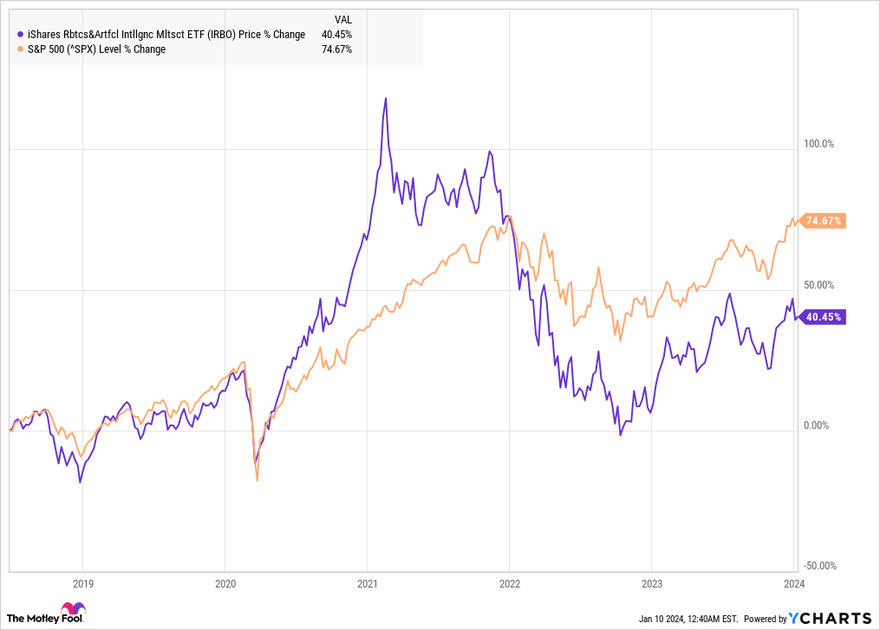
IRBO's expense ratio is competitive at 0.47%, and its dividend yield at the time of this writing was 0.88%. The fund's performance will likely be heavily influenced by the overall performance of cloud stocks since it seems more exposed to cloud stocks and chipmakers than AI companies.
4. First Trust Nasdaq AI and Robotics ETF
4. First Trust Nasdaq Artificial Intelligence & Robotics ETF
First Trust Nasdaq Artificial Intelligence and Robotics ETF (ROBT -0.1%) seeks to track the Nasdaq CTA Artificial and Robotics index, which comprises companies engaged in AI and robotics in technology, industrials, and other sectors.
Related investing topics
The ETF, which started in 2018, surged during the pandemic, in part because tech stocks make up more than 60% of its holdings. The ETF currently owns 108 stocks, and the top five include Illumina and:
- Upstart Holdings (UPST -0.58%): AI-based consumer-lending company Upstart uses AI technology to improve default and acceptance rates and originates loans.
- Luminar Technologies (LAZR 0.8%): Luminar is an automotive technology company that makes sensor and software technology, like laser imaging, ranging sensors, and lidar.
- Ocado Group (OTC:OCDDY): Ocado is a U.K.-based online grocery retailer that sells products through its website and partners with established grocery chains.
- SentinelOne (NASDAQ:S): Cybersecurity provider SentinelOne is known for AI-powered autonomous threat prevention and detection and a focus on endpoint security.
The First Trust ETF offers an expense ratio of 0.65% and a dividend yield of 0.23%. Although its trading history is relatively short, you can see from the chart below that its performance is similar to the S&P 500 overall.
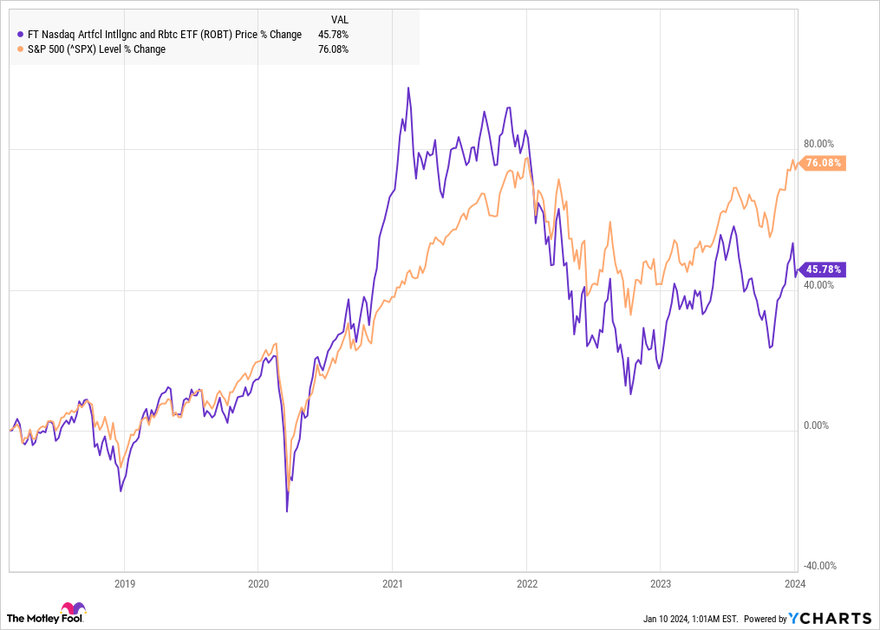
Should I buy?
Should I buy AI ETFs?
The best way to decide which ETF to buy is to consider which stocks a fund holds and how many of them are true AI companies. A fund's expense ratio, dividend yield, and past performance are also important. You can opt to invest in a basket of all four of these AI ETFs to maximize your diversification.
Over time, AI, like chatbots, will grow only smarter and play a greater role in our daily lives. Already, AI represents a global market worth hundreds of billions of dollars, and its wide range of practical applications includes smartphone face recognition, predictive algorithms in internet search, smart home devices, and autonomous vehicles. So, pay attention to the AI market now, and you may find yourself reaping the rewards in years to come.
FAQs
Investing in Artificial Intelligence ETFs: FAQs
Which ETF is best for AI?
AI investors have several options in ETFs. The best-known of the AI ETFs above is BOTZ, which holds a number of well-known AI stocks, including Nvidia and Intuitive Surgical.
AI investors may also want to consider an ETF that tracks the Nasdaq 100, such as the Invesco QQQ ETF (Nasdaq: QQQ), because big tech companies with exposure to AI make up almost half of the fund.
Does Vanguard have an AI ETF?
Vanguard does not currently offer an AI-focused ETF. However, the asset manager offers an information technology ETF that includes several AI stocks.
What is the best AI to invest in?
The best-known AI stock right now is Nvidia, and it's also been the most successful stock in AI. Past performance does not guarantee future returns, but it makes sense to invest in ETFs with exposure to Nvidia and other AI chip stocks as they emerge.
Does Charles Schwab have an AI ETF?
Charles Schwab does not have an AI ETF. However, the brokerage firm does have an AI "theme" that contains as many as 25 AI stocks that Schwab account holders can buy together based on Schwab's proprietary algorithms and research.




















